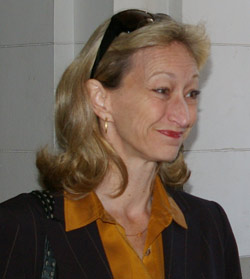California secretary of state outlines ambitious reforms to election system
| 31 October 2008
BERKELEY — Saying "I want people to be very confident when I announce the vote," California Secretary of State Debra Bowen, speaking this week at UC Berkeley, described wide-ranging efforts to regain the confidence of citizens shaken by hanging chads and other electoral dysfunctions.
"We've had a lot of concern in the country around the integrity of elections, and a lot of concern around politicization of elections starting in 2000, which I think was a big wake-up call," said the state's chief elections officer.
 Secretary of State Debra Bowen (Aileen Kim photo) |
Bowen, in an Oct. 29 talk sponsored by the Osher Lifelong Learning Institute, said that her office, working with a UC team led by Berkeley computer-security expert David Wagner, conducted a "top to bottom" review of the voting systems used by California's 58 counties, poring over source code, user manuals, and system security for potential problems. For the security audit, computer scientists were tasked with compromising the voting machines and/or the security of the voting systems.
"I suspected we had security issues," said Bowen, "but we found more than I thought we would see." Problems ranged from insecure key access (a mini-bar key or office file cabinet key could open every voting machine in the country manufactured by one vendor, for example) to password protection glitches.
As a result of the review, Bowen severely restricted the use of touch-screen voting systems in California (making exceptions for special circumstances such as use by disabled voters), in favor of paper ballots that can be tallied by high-speed optical scanners. That August 2007 decision was decried by voting-system vendors and a number of county election officials, who claimed that paper balloting would lead to massive delays in election results. But the two California elections since have gone well, Bowen said.
Fair elections also require secure transport and storage of election equipment and ballots, Bowen noted. "We try to treat every election machine and every batch of ballots as though it were evidence in a trial," she said, and to bring "a lot of science" to auditing of election results once ballots have been cast. Under new requirements, California now randomly audits, by hand count, one percent of its election precincts. And it automatically recounts 10 percent of ballots by hand in any precinct where the leading candidates are within one half of a percentage point after the first tally.
Cribbing lessons from Florida's Katherine Harris and Ohio's Kenneth Blackwell on "how not to be a secretary of state," Bowen said a head election officer should not "co-chair anybody's presidential campaign, fundraise for any candidate," or wear any campaign paraphernalia. "It's my job to make sure that election rules give us the right results," she added, "even if one of the candidates doesn't step forward and ask for it. It would have been in all our interest if we'd done that in recent elections in this country."
California now has about 17 million registered voters — 60,000 of whose cards, Bowen said, were received on Oct. 20, the cutoff date for those hoping to vote in the Nov. 4 election. Her office is currently completing a new voter-registration database, which in turn will make it possible to initiate online voter registration.
This spring Bowen received a 2008 John F. Kennedy Profile in Courage Award, along with just two other U.S. public servants, for her election-reform efforts. The committee cited "her bold leadership and her steadfast resolve to protect the integrity of the vote."

